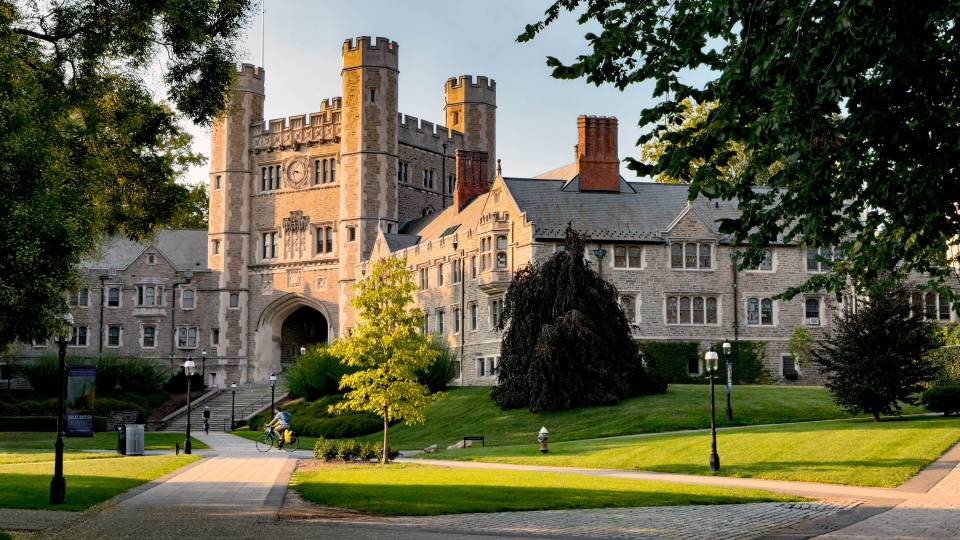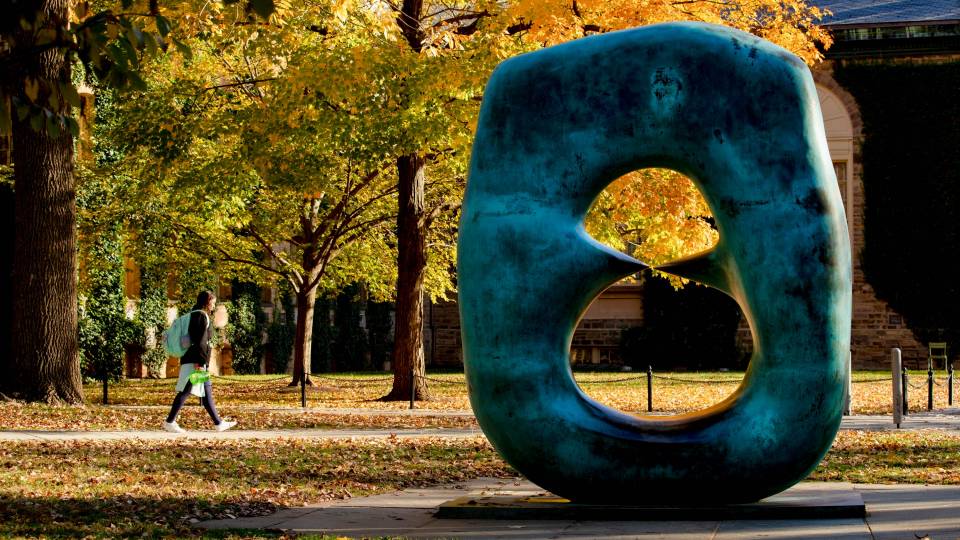The following message from President Christopher L. Eisgruber was emailed to undergraduates, graduate students, faculty, staff, postdocs and researchers on Oct. 19, 2020.
October 19, 2020
Dear Princetonians,
As we move into the second half of this unusual and difficult fall semester, I write to update you about our response to the COVID pandemic and the factors relevant to our planning for the spring semester.
I want to begin by expressing my renewed appreciation and admiration for the way that students, faculty, staff, parents, and alumni have adapted to the challenges of the pandemic. All of us have had to change the way that we work and live, and some of our families have had to cope with tragic illness and loss. This University has been able to carry forward its teaching and research mission because of the creativity and perseverance of people throughout our community. I am especially grateful to the many individuals who have taken on entirely new assignments during this crisis, who have assisted on the front lines of the pandemic, who have restarted research facilities and reopened libraries, or who have worked ceaselessly, through countless weekends and lost vacations, to support our remote teaching program and maximize the likelihood that we can bring our undergraduates back to campus in the spring.
Our on-campus populations have been modeling best practices and developing protocols for safe operation. Though our undergraduate teaching program for this semester is almost entirely remote, we have resumed some on-campus graduate instruction and research programs. We also have approximately 250 undergraduates in residence. Any student, staff member, or faculty member who is on campus for more than eight hours per week is required to participate in our asymptomatic testing program, and the results have thus far been encouraging.
As Princeton’s online COVID-19 dashboard indicates, we have administered over 30,000 tests with only 23 positive results. Our population is staying healthy, and on-campus spread has thus far been non-existent. Notably, we have had only one positive case in our on-campus undergraduate population over a period that now spans more than six weeks.
These results are consistent with reports from many other American campuses with extensive asymptomatic testing protocols. On campuses that have instituted and followed responsible public health guidance accompanied by extensive testing, there is as yet no evidence that the virus is spreading in instructional settings or in dormitory housing. Infection rates for undergraduates at most of these institutions have been remarkably low, with the vast majority of cases that arise being traceable to off-campus social events.
I am grateful to Princeton’s students, faculty, and staff for consistently wearing masks, social distancing, washing hands, and limiting unnecessary contact both on campus and at home. These simple measures are keeping people healthy and saving lives. Continued commitment to these best practices increases substantially the likelihood that we can bring back more undergraduate students for the spring semester.
In addition to developing and assessing protocols to make campus operations as safe as reasonably possible, we have been taking other steps to increase our capacity to support the return of residential education and on-campus research. These include the establishment of an on-campus testing laboratory, expected to begin operations next month, which will facilitate our COVID testing process and provide results within twenty-four hours. We have also been consulting with leaders at other campuses and a range of public health experts to understand what is working, what is not, and how best we can apply these lessons at Princeton.
In light of what we have learned from our experience and data from other colleges and universities, we are preparing for the possibility that we will be able to welcome back significantly more undergraduate students in the spring. If we are able to do so, residential life will, of course, be far more constrained than what existed before the pandemic began. Vice President for Campus Life W. Rochelle Calhoun and Dean of the College Jill Dolan will soon be distributing a survey to a representative sample of undergraduates to help us assess how we can best accommodate an on-campus undergraduate population in the spring if indeed we can invite more undergraduates back.
Though the early fall has gone well on this campus and for many of our peers, the next six weeks will provide additional, and crucial, information. Nobody expected September to be the hardest month. National infection rates have nevertheless risen to near-record levels; New Jersey’s rates are ticking upward; and challenges will likely increase as colder temperatures force people indoors, the flu season begins, and people gather for holiday celebrations.
We will continue to monitor the pandemic’s progress in American society at large and on college campuses. We are also working with the state government to determine how we can best protect our community and operate effectively as infection rates rise and fall. I am grateful to Governor Murphy and his administration for all they are doing to enable New Jersey colleges and universities to resume activities responsibly.
We expect to announce decisions about the spring semester in the first week of December. I recognize that the continued uncertainty is unwelcome, and I wish it were possible to make an earlier announcement. We have to contend, however, with factors beyond our control, including changing infection rates and their impact on the regulatory environment. Any apparent certainty that we might provide now would prove illusory because it would be contingent upon the impact of conditions that will change as the winter takes hold.
I will close as I began, by thanking students, staff, faculty, parents, and alumni for responding like Tigers to this unprecedented and dangerous pandemic. Your good will, ingenuity, and persistence have allowed this University to pursue its teaching and research mission in novel ways while keeping our community healthy and well. We will need your continued commitment as we build on this progress to restore more on-campus operations and overcome the challenges of COVID-19.
With best wishes,
Christopher L. Eisgruber







